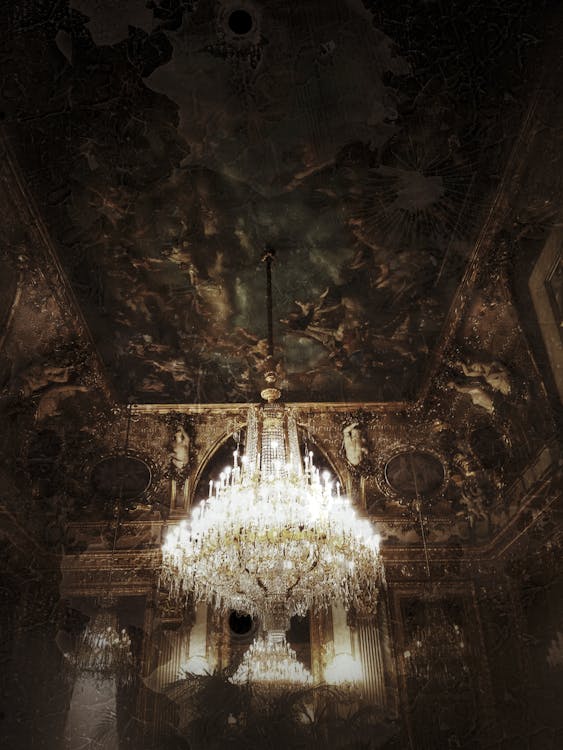Luxury lighting fixtures are not just functional objects designed to light up a space, they are true works of art that tell a story. From the opulence of classic crystal chandeliers to modern and sleek pendant lights, these centerpieces of interior decoration embody the evolution of design through the centuries. Let’s dive into the fascinating history of luxury lighting fixtures, from their appearance to today.
1. The Golden Age of Chandeliers: A Symbol of Power and Opulence 👑

Chandeliers appeared in the Middle Ages in large European homes and castles. At the time, they were made of wood, often decorated with candles, and hung in great halls to light royal banquets.However, it was in the 17th century, under the reign of Louis XIV, that chandeliers took on a more luxurious turn. With the discovery of advanced glassmaking techniques and the introduction of crystal, chandeliers became true interior jewels.
The crystal chandelier from Baccarat or Murano became a symbol of power and social status. Hanging in palaces and royal residences, it embodied elegance and opulence. These imposing pieces reflected not only light, but also the wealth and prestige of the families who owned them.
2. Art Deco: The Revival of Luxury in the 1920s 🏙️

The 1920s marked a turning point in the history of luxury lighting with the emergence of the Art Deco movement.This style is characterized by geometric lines, abstract patterns, and a bold use of materials such as chrome, frosted glass, and gold. Art Deco lighting fixtures, especially table lamps and wall sconces, become objects of desire for lovers of modern design.
The shapes become more refined, the patterns more stylized, and innovative materials allow for creations of great sophistication. At this time, luxury is expressed through the originality of the design and the quality of the finishes, reflecting a new way of life marked by progress and avant-garde.
3.Scandinavian Design: Simplicity and Functionality 🔄

In the 1950s, the Scandinavian movement introduced a new approach to design, focusing on simplicity, functionality, and natural materials. The lighting fixtures from this period stand out for their clean shapes and their harmonious integration into minimalist interiors. Light wood, metal, and glass are used subtly to create modern lighting fixtures that combine beauty and practicality.
This style of lighting, now highly appreciated, has managed to redefine luxury by making it more accessible and universal, without sacrificing elegance.Scandinavian design promotes an approach where every detail matters, favoring durable and aesthetic pieces that can fit into a wide variety of interior styles.
4. Contemporary Lighting: A Blend of Art and Technology 🌐
The 21st century marks a revolution in the world of luxury lighting thanks to advances in technology and the emergence of contemporary design. Today, high-end lighting does more than just illuminate; it transforms into sculptural works and interactive objects. Avant-garde designers are pushing the limits of form, material, and light to create futuristic pendants, minimalist floor lamps, and even lighting fixtures that incorporate smart technologies.
Traditional materials such as crystal or metal now coexist with innovative materials such as plexiglass, ceramic or even programmable LEDs. Some lights allow you to change the lighting atmosphere via mobile apps, while others automatically adapt to the natural light in the room.
This fusion between technology and design allows for total customization of lighting, while maintaining a level of refinement unique to luxury lighting.
5.Ecology at the Service of Luxury: Towards Sustainable Design 🌿

With growing environmental awareness, many luxury lighting manufacturers are now turning to eco-friendly practices. This includes the use of recycled materials, environmentally friendly manufacturing processes, as well as the integration of energy-saving technologies such as LED bulbs.
Contemporary luxury lighting combines durability and aesthetics, proving that it is possible to create pieces that are both refined and environmentally friendly. Some designers are even exploring bio-inspired lighting concepts, drawing inspiration from natural elements such as the shape of plants or the way light is diffused in natural ecosystems.
✨ Conclusion: A Constant Evolution of Luxury
From the splendor of crystal chandeliers to futuristic and eco-friendly pendants, the history of luxury lighting fixtures is a story of innovation, a passion for design, and a constant desire to combine beauty and functionality. Each era has brought its share of innovations, creating pieces that forever mark the history of lighting and interior design.
Want to discover timeless and innovative lighting fixtures? 🌟 Visit our online store to explore our collection of luxury lighting fixtures, and find the perfect piece to illuminate your home with elegance and modernity. 💡








